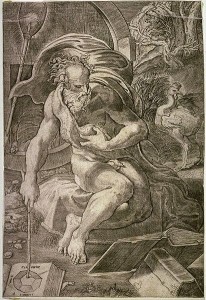Diogenes of Sinope ( 404- 323 B.C.E.) was the most prominent cynic known to Philosophers. He was a student Antisthenes , but Antisthenes regarded him as the first Cynic Philosopher. He is originally from Sinope but most of his stories take place in Athens. Diogenes maintains a teacher's emphasis on ethics, but has a great sense of humor in the History of Philosophy. Researchers wonder if he ever left anything in writing., and if so they have been lost. Cynicism is made of two components of ethical practice, writing and living. In agreement with Socrates and Plato, Diogenes believes direct verbal contact is superior to writing.


Diogenes' life is quite sketchy. A story claims that the oracle of Delphi came to Diogenes and tried to convince him to corrupt the political currency but apparently misinterpreted it and defaced the state currency. Another story, which may just be a story, equidistant around his enslavement in Corinth after being abducted by pirates. He was purchased by Xeniades. This gives many different endings to this story. One ending says he was freed after becoming a loved member of his family. One maintains Xeniades freed Diogenes immediately. The last instates he grew old and passed away in the Corinth home of Xeniades. The multiple tales of Diogenes' life include the many different ways he supposedly died. Most do concur that he was very old, about ninety. One tale says he died by holding his breath, while another said death by dog bite.
Diogenes had a sense of shamelessness seen obviously in cynicism itself. When Plato was asked about Diogenes and his personality he replied, "A Socrates gone mad." His Philosophical practices pursued him to be labeled "mad" for going against convention. To him , conventions lack reason. Diogenes believes that people should be lead by leashes like animals, or let reason guide him or her. Reason guides the path of direction for the right way of life and away from mistakes. Diogenes dos not despise knowledge, just the pretenses that knowledge has no purpose.
Diogenes despised sophism's, by proving that a human doesn't have or "grow" horns after touching their forehead. On another foot, Diogenes claims that their is no motion by walking around. Diogenes alternates Platonic definitions which brings up another story. Plato once gave a definition of human beings as " an animal, biped and featherless," and he was applauded. Diogenes preceded to yank the hair from a fowl, trotted him into a lecture room, and gave this statement, "Here is Plato's human being." Diogenes was a caterwauling critic of Plato's, disregarding his theories at every turn, and showing a break of ethics.
Diogenes has a superior resignation of social and religious views that most readers would believe his point of view is negative. This is not factual though. He is a contentious, or quarrelsome. He is however, promoting reason and virtue. For a person to be rational is to be in rapport with nature, and to be in rapport with reason as a human being. Diogenes had trouble finding such beings, that he expressed himself theatrically. He was once claimed to have lit a lamp in the middle of the day and was "searching for a human being."
To Diogenes and Cynics, life is the life worth living. They claim that life in conformity with reason is better than polis. Diogenes was an exiled, penniless homeless man who still considered that the good life. He experienced the ample misfortunes people continue to write about. Diogenes claimed that "to fortune he could oppose courage, to convention nature, and to passion reason."
Diogenes had a sense of shamelessness seen obviously in cynicism itself. When Plato was asked about Diogenes and his personality he replied, "A Socrates gone mad." His Philosophical practices pursued him to be labeled "mad" for going against convention. To him , conventions lack reason. Diogenes believes that people should be lead by leashes like animals, or let reason guide him or her. Reason guides the path of direction for the right way of life and away from mistakes. Diogenes dos not despise knowledge, just the pretenses that knowledge has no purpose.
Diogenes despised sophism's, by proving that a human doesn't have or "grow" horns after touching their forehead. On another foot, Diogenes claims that their is no motion by walking around. Diogenes alternates Platonic definitions which brings up another story. Plato once gave a definition of human beings as " an animal, biped and featherless," and he was applauded. Diogenes preceded to yank the hair from a fowl, trotted him into a lecture room, and gave this statement, "Here is Plato's human being." Diogenes was a caterwauling critic of Plato's, disregarding his theories at every turn, and showing a break of ethics.
Diogenes has a superior resignation of social and religious views that most readers would believe his point of view is negative. This is not factual though. He is a contentious, or quarrelsome. He is however, promoting reason and virtue. For a person to be rational is to be in rapport with nature, and to be in rapport with reason as a human being. Diogenes had trouble finding such beings, that he expressed himself theatrically. He was once claimed to have lit a lamp in the middle of the day and was "searching for a human being."
To Diogenes and Cynics, life is the life worth living. They claim that life in conformity with reason is better than polis. Diogenes was an exiled, penniless homeless man who still considered that the good life. He experienced the ample misfortunes people continue to write about. Diogenes claimed that "to fortune he could oppose courage, to convention nature, and to passion reason."
No comments:
Post a Comment
Note: Only a member of this blog may post a comment.